
Engaging Coloradans in research and education to support pollinator conservation.
Registration is closed for the 2024 season. Sign up here to be notified about future opportunities!
Keep in touch by signing up for the e-newsletter!
Recent News:
- Native Bee Watch receives a National Science Foundation grant! Read more here: NSF grant bolsters community science, novel AI and pollinator conservation
- What’s the Buzz Around Native Bee Watch?!
- Governor Polis and the Department of Natural Resources Release Pollinator Report
- Read the Colorado Native Pollinating Insects Study
- Watch a new webinar (July 2024): Bumble Bee Ecology and Conservation on the Front Range and Beyond by Dr. John Mola!
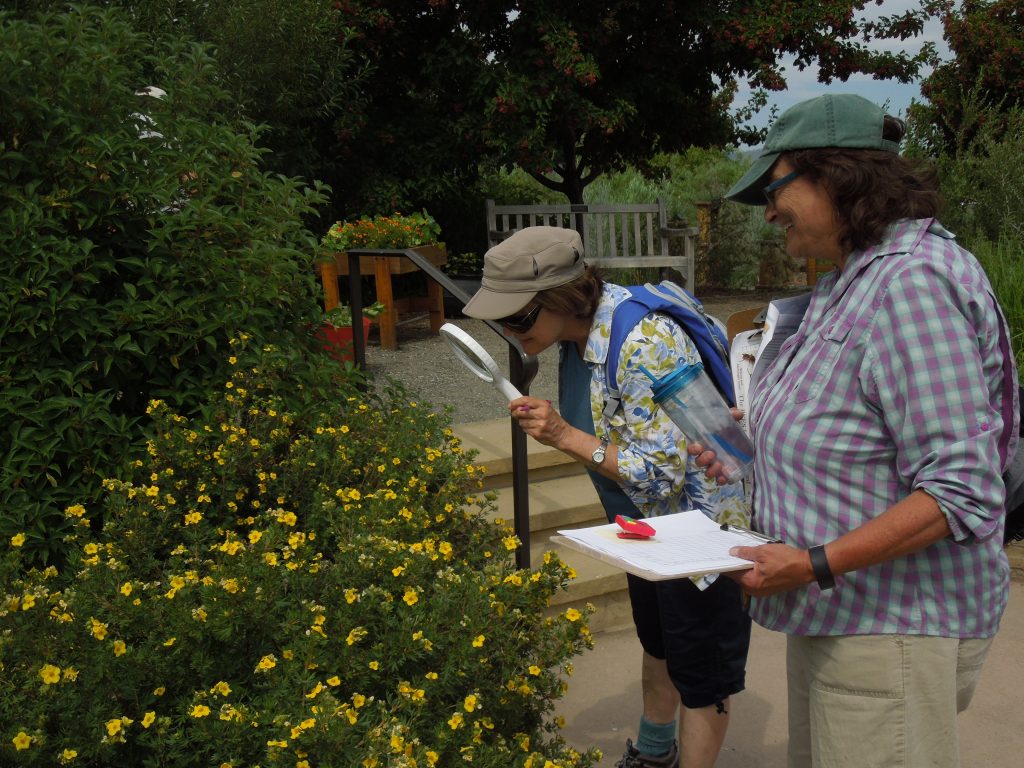
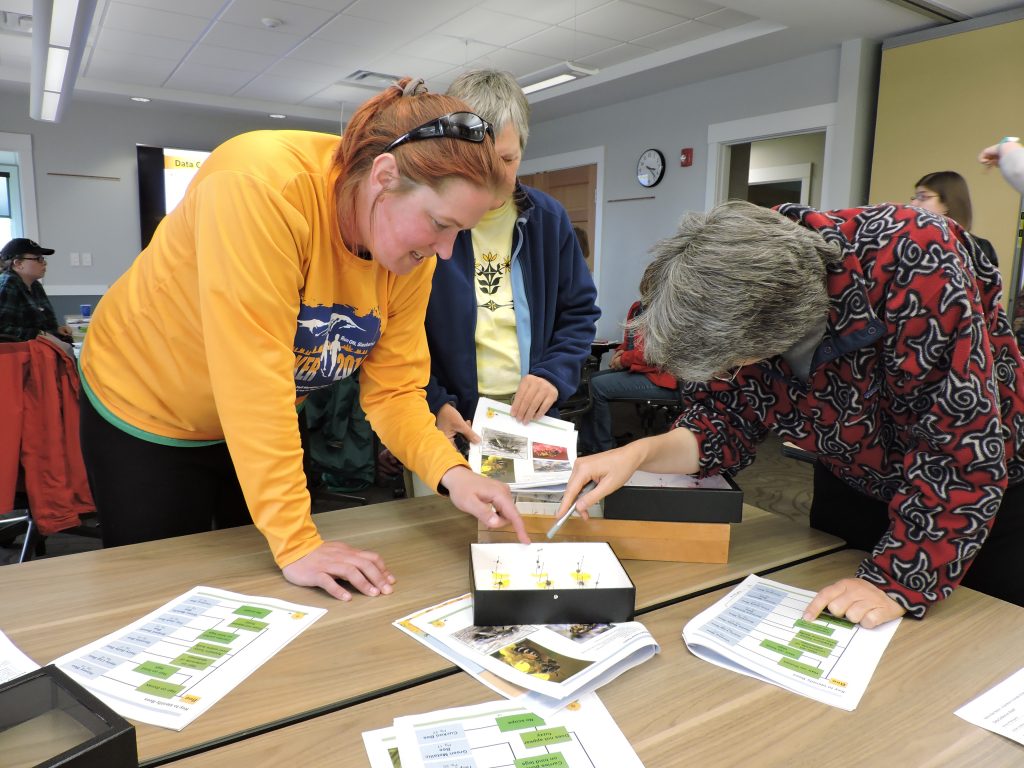
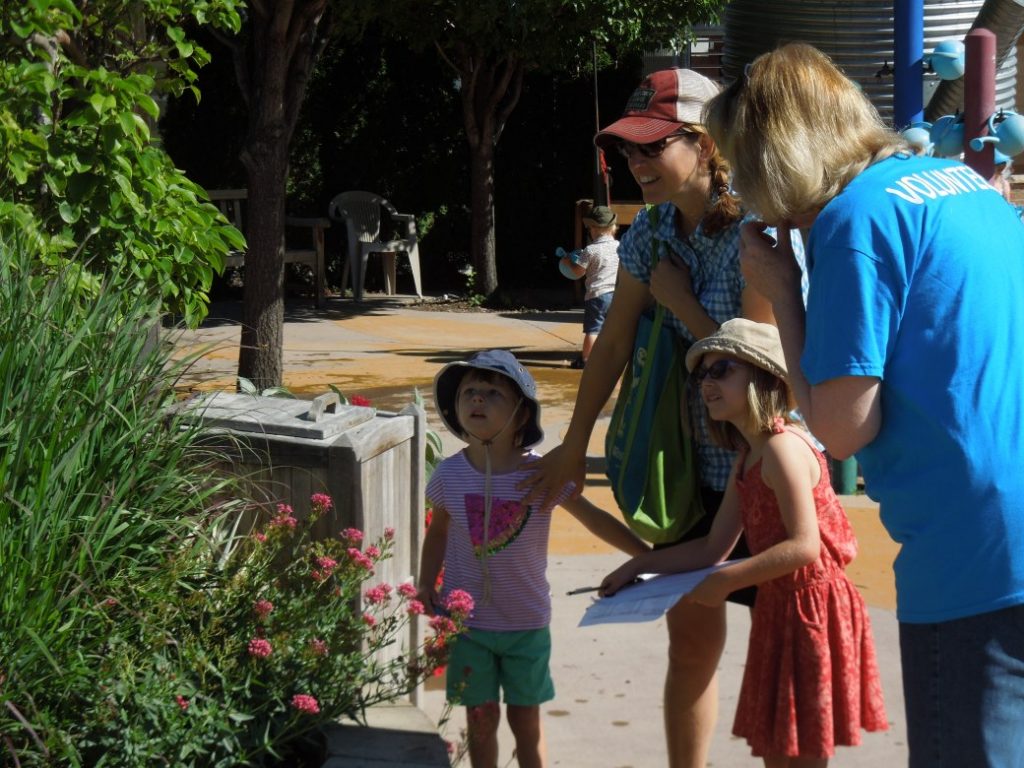
With pollinator conservation rising to the top of environmental concerns, our purpose is to be a resource for the community, research bee diversity and abundance, and provide the long-term monitoring data. Conservation for bees and pollinators isn’t just a job for scientists, but for the community too!
About the Project
Native Bee Watch is a community science biodiversity monitoring project that began in 2016 at Colorado State University. The project is now a statewide program within Colorado State University Extension.
- Meet the Native Bee Watch Team
- Read about us in a CSU Source story: What’s the buzz? Count and conserve bees in your community with Native Bee Watch
Why Monitor Bees?
There are over 1,000 native bee species in Colorado! With this incredible diversity, we want to learn more about the bees and the plants they are pollinating. The overall goals of the project include: 1) educating Coloradans on the importance of native bees, pollinators, and biodiversity in our landscapes, and 2) contributing to research in ecology, adult learning, and computer science/AI technology. We hope to contribute to a ripple effect from awareness to action that supports pollinator conservation.
Pollinators are responsible for one-third of the human diet including vegetables, fruits and nuts – the most nutritious part of our diet. Over 75% of plants on earth need pollinators to reproduce. Due to a variety of factors like habitat loss, pollinator populations are declining. Pollinator conservation takes locally based solutions and dedication from the community.
We chose to make Native Bee Watch a community science program so that the community can be involved in research. Volunteers learn about bee biology and identification, and become an steward for pollinators and the environment.
If you are interested in this project, please contact Lisa at Lisa.Mason@colostate.edu.
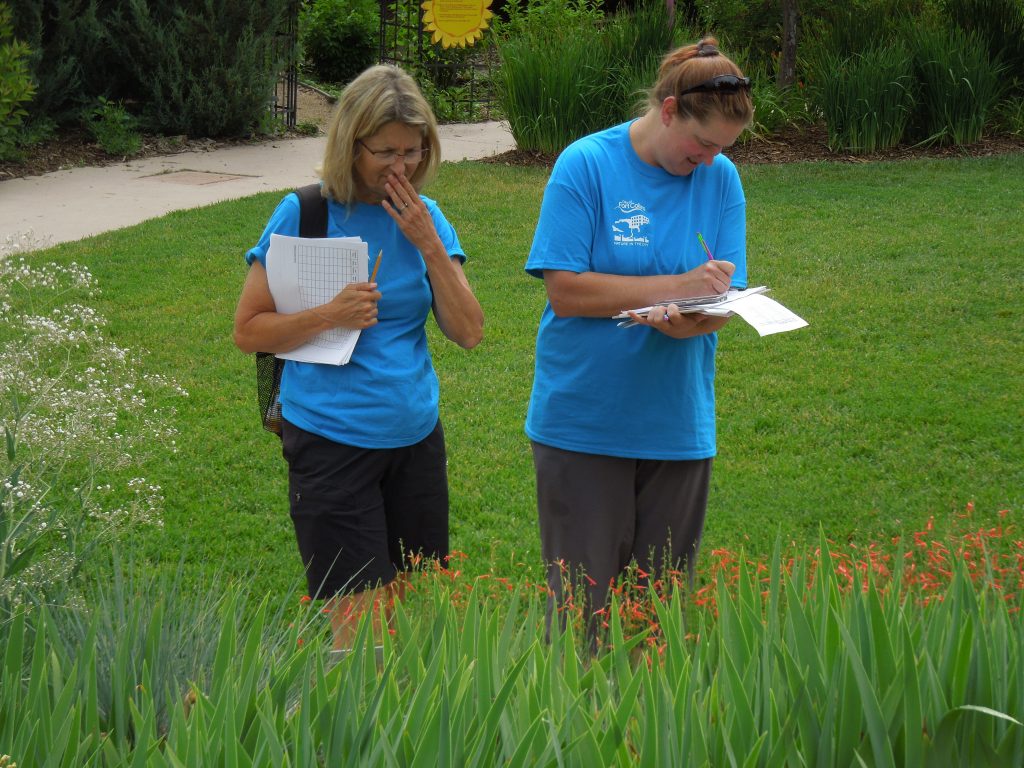
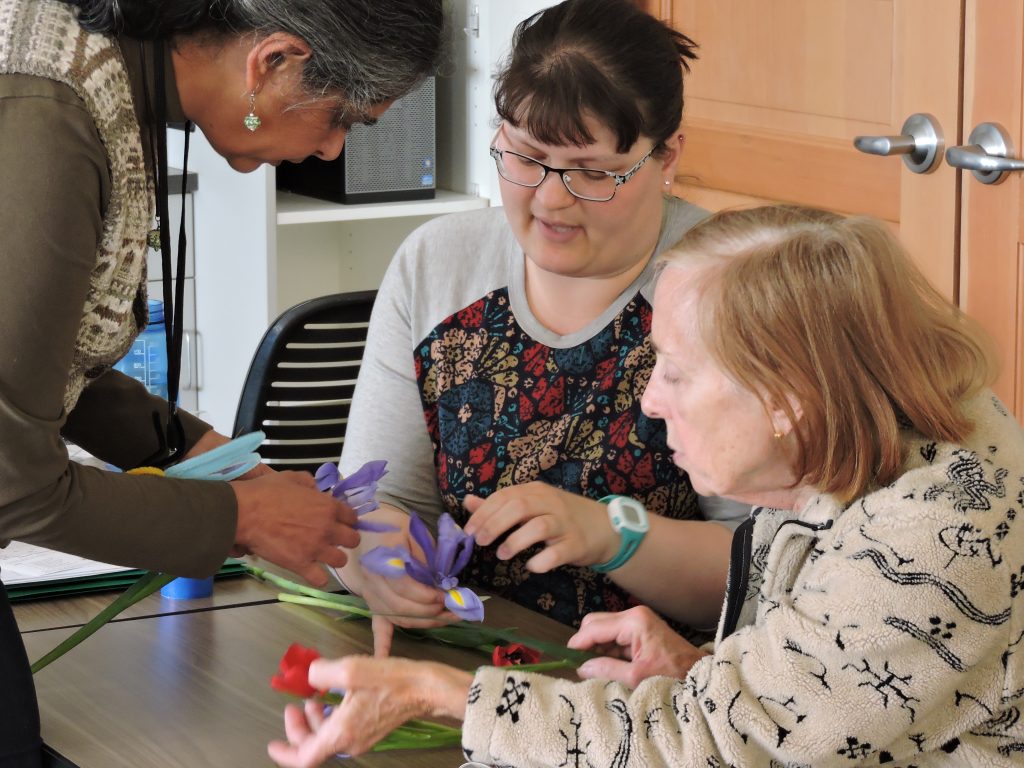
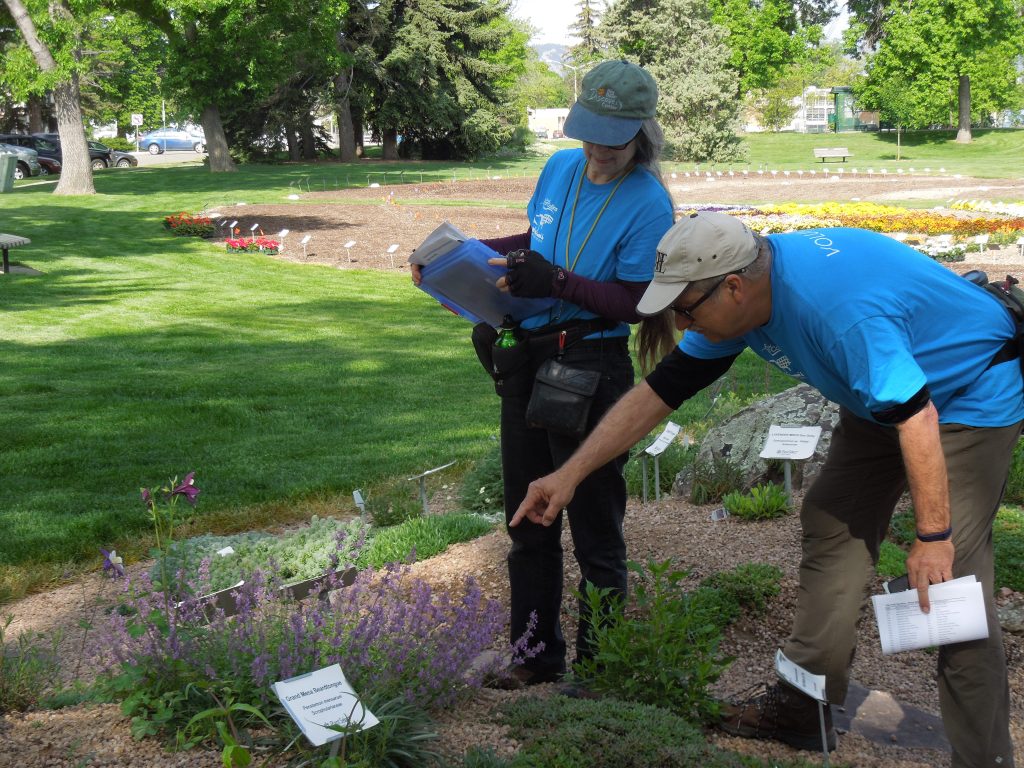
Get Involved
Requirements to participate Native Bee Watch:
- Must attend a two-hour virtual training session or watch a recorded training session.
- Live trainings will be held each May.
- Must be willing to submit data at a minimum of twice a month from June through August.
No prior skills needed. All training on how to monitor bees will be provided at the training session. Bee monitoring data can be collected in your own backyard!
Checkout the Bee Information section for a jump start on training.
The social media toolkit has resources for you to share your involvement with Native Bee Watch on your social media platforms. Tell your family and friends why you are volunteering for Native Bee Watch!
Please keep the following emails on your “safe senders” list: lisa.mason@colostate.edu and nativebeewatch@gmail.com.
Bee Information
We believe that building awareness surrounding native pollinators and native pollinator friendly plants is critical! Please take time to learn more and share this information with your family, friends and neighbors.
Native Bee Watch Field Guides
Native Bee Watch: A Colorado Citizen Science Field Guide
A Beginner’s Field Guide to Identifying Bees
Extension Fact Sheets and Relevant Publications
- Creating Pollinator Habitat
- Attracting Native Bees to Your Landscape
- Attracting Butterflies to Your Garden
- Building and Managing Bee Hotels for Wild Bees
- Bees and Nuisance Wasps
- The Bumble Bees of Colorado: A Pictorial Identification and Information Guide
- The Bees of Colorado
- Bee Hotel Resources
Blog Posts on Pollinators
Check out the CO-Horts Blog for information on pollinators and other important topics written by your CSU Extension Horticulture Staff from around the state. Here are some recent posts on pollinators:
- Let’s Celebrate Pollinators Every Week
- Buzzing Research on Pollinator Conservation
- Plant Native Plants to Support Native Bees
- BEE Thankful for Pollinators
- Where Do Bees Go in Winter
- The Buzz on Bees and Wasps
- The Fascinating Lives of Butterflies
- All About Wasps – Part I
- What is a Pollinator Syndrome?
- Your Pollinator Book List: Ideas to Read
Research, Projects and Resources
Published Research and Completed Projects
2022 – 2024 – Interactive data dashboard
2023 – Community Science Online: Building Capacity for Native Bee Monitoring
2022 – A Beginner’s Field Guide to Identifying Bees
2021 – Interactive data dashboard
2020 – Native Bee Watch Undergraduate Internship – Sarah Viders poster presentation, CSU Source story and Sarah’s Sustainability Secrets video series
2019 – Assessing the efficacy of citizen scientists monitoring native bees in urban areas
2018 – Native Bee Watch: A Colorado Citizen Science Field Guide
For School Teachers
Bring native bee education into your classroom! Bee Please! STEM Kits available to check out for FREE! Activities utilize community science data collected through Native Bee Watch. Learn more about STEM kits available for check out at the CSU’s Education and Outreach Center.
Organizations Supporting Pollinator Conservation
National
- The Xerces Society
- The Pollinator Partnership
- The Native Bee Inventory and Monitoring Lab – USGS
- U.S. Forest Service
Local
- Plant Select
- Colorado State University
- The Colorado Native Plant Society
- Denver Botanic Gardens
- The Butterfly Pavilion
- Denver Audubon Society
In the News
March 8, 2024 – The County Line, Arapahoe County – What’s All The Buzz Around Native Bee Watch?!
January 17, 2024 – CSU Source – NSF grant bolsters community science, novel AI and pollinator conservation
March 3, 2022 – The Denver Channel – Colorado bill aims to save bee populations by restricting pesticide use
November, 2021 – The Conversation – 4 Unexpected Places Where Adults Can Learn Science
June 28, 2021 – Colorado Public Radio – From Plants To Pesticides, Answering More Colorado Wonders Questions About Pollinators
June 18, 2021 – Colorado Public Radio – Have You Noticed Fewer Bees in Colorado This Year? You’re Not Alone
May 14, 2021 – CSU Source – What’s the buzz? Count and conserve bees in your community with Native Bee Watch
Oct. 11, 2020 – CSU Source – Virtual internship inspires creativity and resilience
Aug 6, 2020 – 630 KHOW Talk Radio with Ross Kaminsky – How we can help bees thrive, and why we should
Aug. 4, 2020 – Denver Post – How to create a bee-friendly garden in Denver to support Colorado’s more than 900 native species
May 12, 2020 – kHEN 106.9 Free Range Radio, Salida, CO – Native Bees
For media inquiries, contact Lisa Mason at lisa.mason@colostate.edu or 303-738-7966
Recent News & Stories
- I Didn’t Know That!By Martha Kirk, Colorado Master Gardener Biocontrols Lend a Helping Hand Biocontrols can be a secret weapon for fighting weeds. The Palisade Insectary grows and offers to the public… Read more: I Didn’t Know That!
- We’ve Got You CoveredBy Kristen Nelson, Colorado Master Gardener The summer solstice has passed, and the long hot days of summer are upon us. Monitoring lawns, trees and gardens is a daily… Read more: We’ve Got You Covered
Horticulture Resources
- Garden Buzz Archives
- CSU Extension Resources
- Colorado Master Gardener Program
- Foothills to Plains Native Plant Master Program
- Native Bee Watch Community Science Program
- The Co-Hort Blog
- PlantTalk Colorado
- Soil Testing
- Plant Select
- Emerald Ash Borer
- Japanese Beetle
- Colorado State Forest Service
- Ask an Expert



